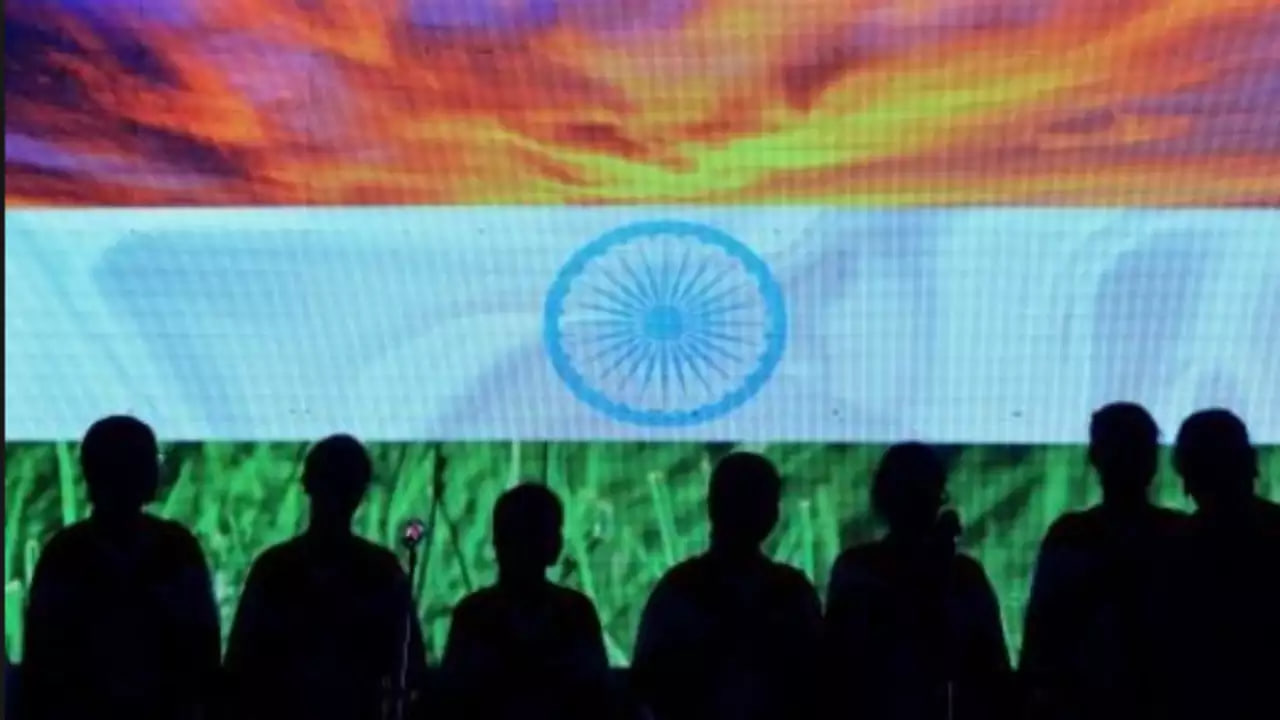Description

Copyright infringement not intended
Context: The National Anthem was played at an event on June 25 in Srinagar, where J&K Lt Governor was the chief guest. However, 11 men who were present at the event did not stand up to show respect for the anthem. They were detained by the police and taken to the police station.
Details
- On July 3, the Executive Magistrate of Srinagar heard the case and ordered the 11 men to be sent to Central Jail Srinagar for 7 days. The magistrate said that the men had violated the law and could cause public disorder if released.
Sections of the Law
- These are some sections of the law that deal with preventing or arresting people who may cause public disorder or commit crimes. They are part of the Code of Criminal Procedure, 1973, which is the main law governing criminal justice in India.
Section 107
- This section empowers an Executive Magistrate to order a person to sign a bond for keeping the peace if the Magistrate thinks that the person is likely to disturb the public peace or can do something wrong that may lead to violence or unrest. The bond can be valid for up to one year and can have conditions attached to it, such as not visiting certain places or not associating with certain people.
- Bond is a legal term that means that a person has to appear before the police or the court on a specified date as part of an investigation or a trial. The person may have to give a surety or a personal guarantee that they will show up, or else they may face legal consequences. The term is often used in court orders to indicate that an accused person has to follow certain rules or restrictions while they are out on bail or parole.
Section 151
- This section allows a police officer to arrest a person without a warrant or a Magistrate's order if the officer has reason to believe that the person is planning to commit a cognizable offence, which is an offence that can be investigated and prosecuted without a Magistrate's permission. The officer can arrest the person to prevent the commission of the offence or to secure evidence against the person.
Bijoe Emmanuel case
- The Bijoe Emmanuel case is a landmark judgment of the Supreme Court of India in 1986, which upheld the right of religious freedom of three students who belonged to Jehovah’s Witnesses, a Christian sect that worships only Jehovah as God.
- The students, Bijoe Emmanuel, Binu, and Bindu, were expelled from NSS High School in Kerala, run by the Nair Service Society, a Hindu organisation, for not singing the National Anthem during the morning assembly.
- They argued that singing the Anthem was against their religious beliefs, as they considered it a form of prayer, and they could only offer prayers to Jehovah. However, they stood up respectfully when the Anthem was sung, as a mark of respect for the country.
- The Kerala High Court dismissed their petition, holding that singing the National Anthem was a duty of every citizen, and not doing so amounted to disrespecting the nation and its symbols. The students appealed to the Supreme Court, which reversed the High Court’s decision and ruled in their favour.
Supreme Court Verdict
- The Supreme Court held that Article 25 of the Constitution, which guarantees freedom of conscience and free profession, practice and propagation of religion, was meant to protect even an insignificant minority from being coerced by the majority.
- The court observed that standing up respectfully when the National Anthem is sung was sufficient to show respect for the country and its symbols, and not singing it did not constitute an offence under Section 3 of the Prevention of Insults to National Honour Act, 1971, which penalises intentionally preventing or disturbing the singing of the National Anthem.
- The court said that the children's refusal to sing was based on their religious beliefs and that expelling them from school violated their Fundamental Right to freedom of conscience and religion. The court recognised that the children had the right to follow their faith and express it freely without being discriminated against.
Shyam Narayan Chouksey vs Union of India (2018)
- The Supreme Court of India had to deal with the issue of playing the National Anthem in cinema halls in the case of Shyam Narayan Chouksey vs Union of India (2018).
- The court had initially passed an interim order in November 2016, which made it mandatory for all cinema halls to play the National Anthem before the start of the movie and for all the audience to stand up as a mark of respect.
- The court had also directed that the doors of the cinema halls should be closed during the playing of the Anthem and that the National Flag should be displayed on the screen.
- However, the court changed its stance in its final verdict in January 2018, the court said that its earlier order was only an interim measure and that playing the National Anthem in cinema halls was not compulsory.

Standing for the National Anthem should be compulsory or voluntary?
- The national anthem of India, Jana Gana Mana, was composed by Rabindranath Tagore and adopted by the Constituent Assembly of India on 24 January 1950. It is a symbol of national unity and pride, and a tribute to the freedom fighters who sacrificed their lives for the country's independence.
- The question of whether standing up for the national anthem should be compulsory or voluntary has been a matter of debate and controversy in India for a long time.
- Some argue that it is a duty and a mark of respect for the nation and its values and that not standing up is an insult and a violation of the Constitution.
- Others contend that it is a matter of personal choice and expression and that forcing people to stand up is an infringement of their fundamental rights and freedoms.
Why it should be made compulsory?
- To show patriotism and loyalty to the country and its ideals.
- To foster a sense of belonging and identity among the citizens.
- To instil a spirit of unity and solidarity among the diverse groups and communities in India.
- To honour the history and culture of India and its people.
- To inspire people to work for the welfare and progress of the nation.
Why it should not be made compulsory?
- It may create resentment and resistance among those who do not wish to stand up for various reasons, such as religious beliefs, political views, physical disabilities, etc.
- It may lead to harassment and violence against those who do not comply with the rule, as seen in some recent incidents where people were assaulted or abused for not standing up in cinemas or public places.
- It may undermine the diversity and pluralism of India, which is based on respect for different opinions and expressions.
- It may reduce the national anthem to a mere ritual or formality, rather than a meaningful expression of love and devotion for the country.
Way Forward
- The way forward for resolving this issue is to find a balance between respecting the national anthem and respecting the individual rights and freedoms of the citizens.
- There is a need for dialogue and education to create awareness and sensitivity among the people about the significance and value of the national anthem, as well as the constitutional provisions and judicial verdicts related to it.
- There is a need for tolerance and mutual respect among the people to accept different perspectives and preferences regarding standing up for the national anthem. Ultimately, standing up for the national anthem should be a voluntary act of patriotism, not a forced act of compliance.
|
PRACTICE QUESTION
Q. Which of these is a restriction imposed by the state on the right to religious freedom in India?
1. Public order
2. Morality
3. Health
4. Nationality
How many of the above codes is/are correct?
A) Only 1
B) Only 2
C) Only 3
D) All
Answer: C
Explanation: The state can impose reasonable restrictions on the right to religious freedom in the interests of public order, morality and health, but not based on nationality.
|

https://indianexpress.com/article/explained/explained-law/standing-up-for-national-anthem-what-the-supreme-court-has-ruled-8812737/










